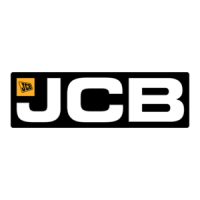Maintenance
Maintenance Safety
83 9831/0650-3 83
Maintenance Safety
General
Exhaust Gases
Machine exhaust gases can harm and possibly kill you or bystanders if they are inhaled. Do not operate the
machine in closed spaces without making sure there is good ventilation. If possible, install an exhaust extractor.
If you begin to feel drowsy, stop the machine at once and get into fresh air.
Communications
Bad communications can cause accidents. If two or more people are working on the machine, make sure each
is aware of what the others are doing. Before starting the engine make sure the others are clear of the danger
areas. Examples of danger areas are: the rotating blades and belt on the engine, the attachments and linkages,
and anywhere beneath or behind the machine. People can be killed or injured if these precautions are not taken.
Machine Modifications
This machine is manufactured in compliance with prevailing legislative requirements. It must not be altered in
any way which could affect or invalidate its compliance. For advice consult your JCB dealer.
Repairs
If your machine does not function correctly in any way, get it repaired straight away. Neglect of necessary
repairs could result in an accident or affect your health. Do not try to do repairs or any other type of maintenance
work you do not understand. To avoid injury and/or damage get the work done by a specialist engineer.
'O' rings, Seals and Gaskets
Badly installed, damaged or rotted 'O' rings, seals and gaskets can cause leakages and possible accidents.
Renew whenever disturbed unless otherwise instructed. Do not use Triochloroethane or paint thinners near
'O' rings and seals.
Hot Components
Touching hot surfaces can burn skin. The engine and machine components will be hot after the unit has been
running. Allow the engine and components to cool before servicing the unit.
Chemicals
Certain seals and gaskets (e.g. crankshaft oil seal) on JCB machines contain fluoroelastomeric materials
such as Viton®, FluorelTM and Technoflon®. Fluoroelastomeric materials subjected to high temperatures can
produce highly corrosive hydrofluoric acid. This acid can severely burn. New fluoroelastomeric components
at ambient temperature require no special safety precautions. Used fluoroelastomeric components whose
temperatures have not exceeded 300°C (571.6°F) require no special safety precautions. If evidence of
decomposition (e.g. charring) is found, refer to the next paragraph for safety instructions. Do not touch
component or surrounding area. Used fluoroelastomeric components subjected to temperatures greater than
300°C (571.6°F) (e.g. engine fire) must be treated using the following safety procedure. Make sure that heavy
duty gloves and special safety glasses are worn: Thoroughly wash contaminated area with 10% calcium
hydroxide or other suitable alkali solution, if necessary use wire wool to remove burnt remains. Thoroughly
wash contaminated area with detergent and water. Contain all removed material, gloves etc. used in this
operation in sealed plastic bags and dispose of in accordance with Local Authority Regulations. Do not burn
fluoroelastiometric materials.
Oil
Oil is toxic. If you swallow any oil, do not induce vomiting, seek medical advice. Used engine oil contains harmful
contaminants which can cause skin cancer. Do not handle used engine oil more than necessary. Always use
barrier cream or wear gloves to prevent skin contact. Wash skin contaminated with oil thoroughly in warm soapy
water. Do not use petrol, diesel fuel or paraffin to clean your skin.
Fuel
Fuel is flammable, keep naked flames away from the fuel system. Stop the engine immediately if a fuel leak is
suspected. Do not smoke while refuelling or working on the fuel system. Do not refuel with the engine running.
Completely wipe off any spilt fuel which could cause a fire. There could be a fire and injury if you do not follow
these precautions.

